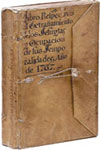The unreasonable effectiveness of mathematics in the natural sciences. Offprint from: Communications in Pure and Applied Mathematics, Vol. XIII, No. 1, February 1960
WIGNER, Eugene P.
Librería:
Landmarks of Science Books, Richmond, Reino Unido
Calificación del vendedor: 5 de 5 estrellas
![]()
Vendedor de AbeBooks desde 17 de marzo de 2016
Descripción
Descripción:
First edition, very rare offprint, and a copy with fine provenance, of this famous article, the text of Nobel laureate Eugene Wigner's Richard Courant Lecture in Mathematical Sciences at New York University in 1959. "Wigner begins his paper with the belief, common among those familiar with mathematics, that mathematical concepts have applicability far beyond the context in which they were originally developed. Based on his experience, he writes, 'it is important to point out that the mathematical formulation of the physicist's often crude experience leads in an uncanny number of cases to an amazingly accurate description of a large class of phenomena'. He then invokes the fundamental law of gravitation as an example. Originally used to model freely falling bodies on the surface of the earth, this law was extended on the basis of what Wigner terms 'very scanty observations' to describe the motion of the planets, where it 'has proved accurate beyond all reasonable expectations.' Another oft-cited example is Maxwell's equations, derived to model the elementary electrical and magnetic phenomena known as of the mid-19th century. The equations also describe radio waves, discovered by David Edward Hughes in 1879, around the time of James Clerk Maxwell's death. Wigner sums up his argument by saying that 'the enormous usefulness of mathematics in the natural sciences is something bordering on the mysterious and that there is no rational explanation for it'. He concludes his paper with the same question with which he began: 'The miracle of the appropriateness of the language of mathematics for the formulation of the laws of physics is a wonderful gift which we neither understand nor deserve.' Wigner also observes that a physical theory's mathematical structure often points the way to further advances in that theory and even to empirical predictions" (Wikipedia). Wigner "was well-qualified for the task having discovered in the 1930s that the well-established mathematical theory of groups was just what he needed to make important progress in atomic physics. He received a share of the Nobel Prize in Physics in 1963 'for his contributions to the theory of the atomic nucleus and the elementary particles, particularly through the discovery and application of fundamental symmetry principles'" (Russ, Interdisciplinary Science Reviews 36 (2011), p. 209). Wigner's original paper has provoked and inspired many responses across a wide range of disciplines. Provenance: Adolf Grünbaum (1923-2018), German-American philosopher of science (signature on front wrappper). Grünbaum was a critic of Karl Popper's philosophy of science. 8vo, pp. 14. Original printed wrappers. N° de ref. del artículo ABE-1695053385406
Detalles bibliográficos
Título: The unreasonable effectiveness of ...
Año de publicación: 1960
Encuadernación: Soft cover
Condición: Fine
Edición: 1st Edition
IberLibro.com es un mercado online donde puede comprar millones de libros antiguos, nuevos, usados, raros y agotados. Le ponemos en contacto con miles de librerías de todo el mundo. Comprar en IberLibro es fácil y 100% seguro. Busque un libro, realice el pedido a través de nuestra página con toda confianza y recíbalo directamente de la librería.
Busque entre millones de libros de miles de librerías
Libros usados
Bestsellers rebajados, autores destacados y una gran variedad de libros por menos de 5 €. Si su pasatiempo es leer, éste es su espacio.
Libros antiguos y de colección
Compendio vital para el amante del libro antiguo: libros firmados, primeras ediciones, facsímiles, librerías anticuarias o destacados.
Libros con envío gratis
Gastos de envío gratuitos para miles de libros nuevos, antiguos y de ocasión. Sin compra mínima.



